5 conservation stories from around Fauquier County, including Cool Lawn Farm, Environmental Studies on the Piedmont, Hopefield, Rappahannock Station and Hunger Run Farm:
Cool Lawn Farm
Land conservation is so important. It’s about leaving a legacy for the next generation.
– Ken Smith, owner of Cool Lawn Farm and Moo Thru
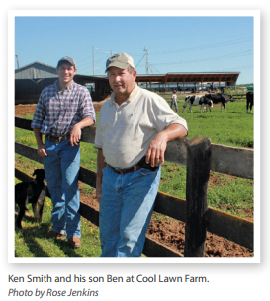
Ken decided to protect Cool Lawn Farm through the Fauquier County Purchase of Development Rights program, which aims to protect working farms. He wanted to preserve both the beauty of the open land as well as its agricultural potential. Protecting the land will also help to ease the transition to the next generation, he says, when his son plans to take over. Ken used some of the money from selling his development rights to start a new farm-related business— an ice cream shop called Moo Thru, located on Rt. 29 in Remington. Moo Thru uses milk from grass-fed cows that graze in fields just a mile away—and the creamy, fresh flavor has been a huge hit!
PUBLIC BENEFITS: Productive Farmland, Scenic View, Water Quality
Environmental Studies on the Piedmont
When you put kids in the right environment, it enhances their sense of curiosity and discovery. In a sense, that’s the beauty of this place—the opportunity to be outside and learn respect for the natural world. It’s when the learning starts.
—Dr. Thomas C. Wood, director of Environmental Studies on the Piedmont
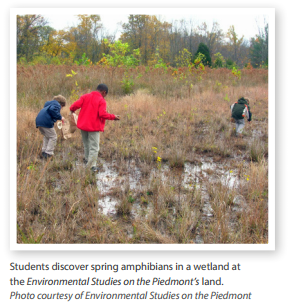
Environmental Studies on the Piedmont is the research education and conservation division of the Clifton Institute located on a 900-acre property just outside of Warrenton. The property is under conservation easement with the Virginia Outdoors Foundation. Environmental Studies works to integrate nature with human activity and development, so that natural resources are sustainably renewed and available to be enjoyed by future generations. They bring scientists and the public together in partnership to accomplish this goal—right on the property.
PUBLIC BENEFITS: Scientific Research, Public Access, Biodiversity
Hopefield
We must remember that Warrenton has a limited supply of water, and it’s so important to protect its small watershed. When there’s a drought, I see the reservoir go way down. Hopefield protects the town’s drinking water supply and helps to provide a green ring around Warrenton.
—Hope Porter, owner of Hopefield
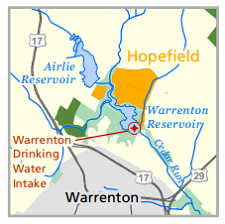
In 1922, Hope Porter’s father purchased Hopefield for their family farm. During the 1960’s, to accommodate increased growth, the Town of Warrenton condemned half of the farm to create the Warrenton Reservoir, the town’s primary drinking water supply. The division of the property and the depletion of water resources made it impossible for Hope’s father to continue growing crops. The family placed an easement on the remaining 185 acres with the Virginia Outdoors Foundation, ensuring the protection of clean water, scenic open space and their family farm for generations to come.
PUBLIC BENEFITS: Drinking Water Protection, Scenic Views, Productive Farmland
Rappahannock Station
Fauquier County’s largest Civil War battle—the Battle of Rappahannock Station—occurred here in November 1863. Now that the land has been protected, Fauquier County has an opportunity to realize the creation of a battlefield park to honor the thousands of soldiers who fought and died on the Rappahannock Front.
—Clark ‘Bud’ Hall, local historian
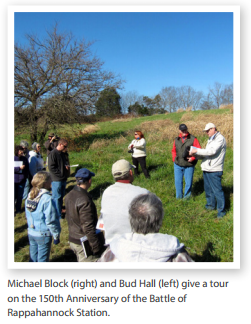
Last decade, the most significant portion of Rappahannock Station was under threat of development. The Piedmont Environmental Council worked with Fauquier County to raise funds for acquiring the property for the most significant acreage of the battlefield. In 2009, an easement was placed on the property, and the County intends for it to become a public park. If completed, the site will provide opportunities for education and appreciation of our local history, passive outdoor recreation, and non-motorized canoe and kayak launch into the Rappahannock River.
PUBLIC BENEFITS: Historic Preservation, Tourism and Recreation, Public Water Access
Hunger Run Farm
I saw the easement on the land as a plus. Easements preserve the beauty of the countryside and gives you a sense of comfort that what you see is what you get.
—John Weidlein, owner of Hunger Run Farm
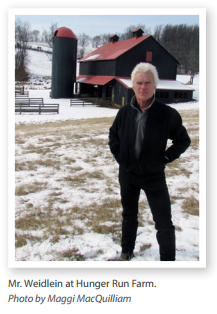
Hunger Run Farm was once owned by the Elgin family, dating their roots on the land back to 1757. The 58-acre property was one of the last remaining dairy operations in northern Fauquier County. In 2001, in order to save the family farm, the Elgins worked with the VOF and PEC to place an easement on the property. Mr. and Mrs. Weidlein purchased the land, subject to an easement, from the Elgins for their home and got to work renovating the old dairy barns. In 2014, Mr. Weidlein invited the Arcadia Foundation to use his land and equipment to grow healthy produce for underserved Washington, D.C. neighborhoods.
PUBLIC BENEFITS: Productive Farmland, Scenic Views, Water Quality Mr. Weidlein at Hunger Run Farm.
This article was featured in our Fauquier County Special Edition of The Piedmont View. You can read more of the articles online or view a PDF of the publication. The publication was issued by The Piedmont Environmental Council, in partnership with the Goose Creek Association, Citizens for Fauquier County, Fauquier Preservation Society, Northern Virginia Conservation Trust, Mosby Heritage Association and the Remington Community Partnership.
